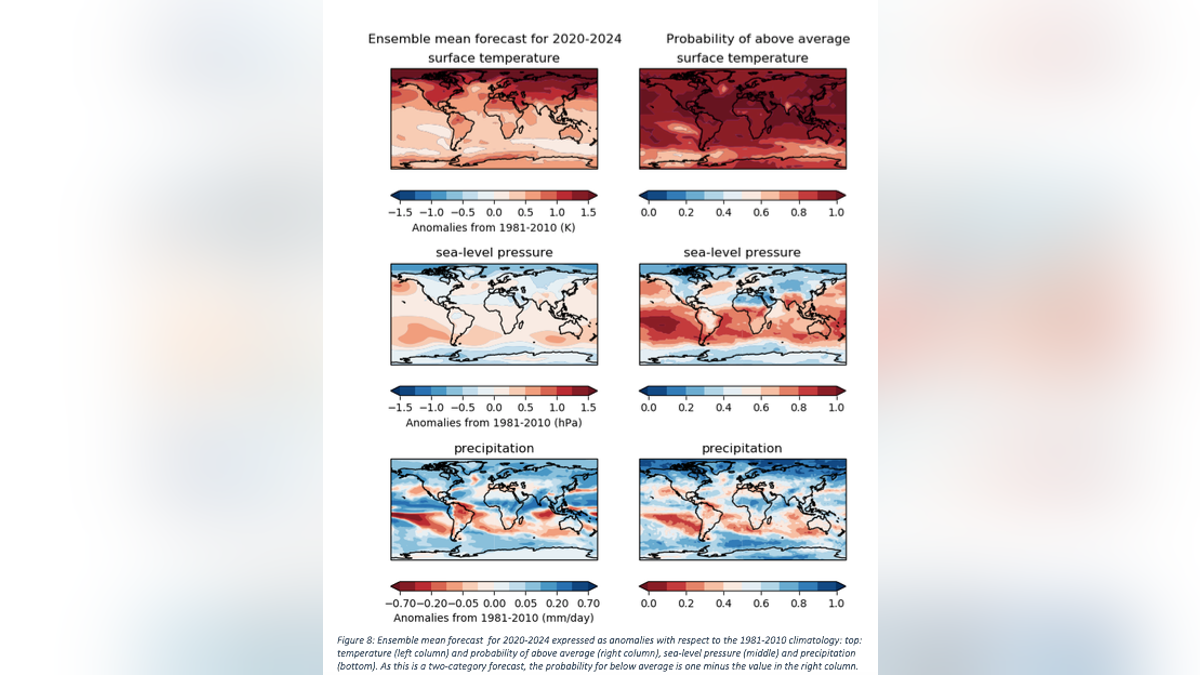Fox News Flash top headlines for July 13
Fox News Flash top headlines are here. Check out what's clicking on Foxnews.com.
The World Meteorological Organization said it expects global temperatures will rise "at least" 1 degree Celsius (1.64 degrees Fahrenheit) in each year of the next five years, far above levels not seen since the Second Industrial Revolution.
“This study shows – with a high level of scientific skill – the enormous challenge ahead in meeting the Paris Agreement on Climate Change target of keeping a global temperature rise this century well below 2 degrees Celsius above pre-industrial levels and to pursue efforts to limit the temperature increase even further to 1.5 degrees Celsius,” said WMO Secretary-General Petteri Taalas in a statement.
The new update also puts a 20 percent chance that temperatures will rise 1.5 degrees Celsius (2.7 degrees Fahrenheit) over the next five years, an increase other researchers have said could wipe out half of the planet’s animal and plant species by 2070.

(Credit: WMO)
The update, which was posted on July 9, notes the previous five-year period "has been the warmest five years on record."
Other highlights from the report include:
- There is approximately a 70 percent chance "that one or more months during the next 5 years will be at least 1.5 [degrees Celsius] warmer than preindustrial levels."
- Researchers said it was "extremely unlikely (approximately 3 percent)" that the "5 year mean temperature for 2020-2024 will be 1.5 [degrees Celsius] warmer than preindustrial levels."
- Between 2020 and 2024, "almost all regions, except parts of the southern oceans, are likely to be warmer than the recent past."
- During the 2020-2024 time frame, "high latitude regions and the Sahel are likely to be wetter than the recent past whereas northern and eastern parts of South America are likely to be dryer."
- The researchers also said that between 2020-2024, "sea-level pressure anomalies suggest that the northern North Atlantic region could have stronger westerly winds leading to more storms in western Europe."
- The fact that temperatures could rise as much as 2.7 degrees Fahrenheit one year is especially important, considering it was a target agreed to by the Paris Climate Agreement.
The landmark Paris Climate Agreement, which was agreed on in 2015 under the Obama administration, has limiting the increase to 1.5 degrees Celsius as its long-term goal. Nearly 200 nations signed the landmark agreement, including China.
GLOBAL WARMING OVER PAST 150 YEARS HAS WIPED OUT 6,500 YEARS OF COOLING, STUDY SAYS
In early November 2019, the Trump administration began its formal withdrawal from the agreement.
The forecasts take into account a number of different inputs from human activity on the climate, however, it does not factor in the economic slowdown caused by the COVID-19 pandemic.
“WMO has repeatedly stressed that the industrial and economic slowdown from COVID-19 is not a substitute for sustained and coordinated climate action," Taalas added in the statement. "Due to the very long lifetime of CO2 in the atmosphere, the impact of the drop in emissions this year is not expected to lead to a reduction of CO2 atmospheric concentrations which are driving global temperature increases.”
“Whilst COVID-19 has caused a severe international health and economic crisis, failure to tackle climate change may threaten human well-being, ecosystems and economies for centuries," Taalas continued. "Governments should use the opportunity to embrace climate action as part of recovery programs and ensure that we grow back better.”
In March, satellite imagery from NASA and the European Space Agency spotted an enormous decline in airborne pollutants, specifically nitrogen dioxide, in China. However, as the shutdown in the world's most populated country ended, air pollutants began to return to normal levels, Fox News reported in May.
CLIMATE CHANGE WILL SHRINK 'VIRTUALLY ALL' ECONOMIES AROUND THE GLOBE BY 2100, STUDY WARNS
A similar decline in U.S.-based pollution linked to the pandemic was spotted in early May by satellites from the National Oceanic and Atmospheric Administration.
Skeptics have largely dismissed fears over man’s impact on global warming, saying climate change has been going on since the beginning of time.
They also claim the dangers of a warming planet are being wildly exaggerated and question the impact that fossil fuels have had on climate change.









































